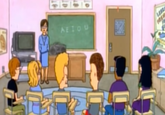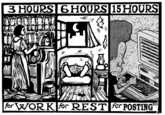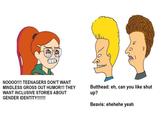Beavis and Butthead
Part of a series on MTV (Music Television). [View Related Entries]
[View Related Sub-entries]
This submission is currently being researched & evaluated!
You can help confirm this entry by contributing facts, media, and other evidence of notability and mutation.

About
Beavis and Butthead is an MTV original animated series that aired from 1993-1997 with the pilot airing in 1992. It was created by Mike Judge, creator of Office Space, King of the Hill and Idiocracy, who also voiced the titular (heheheh) title characters. Episodes were approximately 15 minutes at most.
Despite receiving criticism for allegedly promoting dangerous behavior in children, it gained a large cult following and has become a staple of 90s culture. The innuendo-heavy and irreverent mannerisms of Beavis and Butthead have been very prevalent in pop culture. Their quotes, laughter and images are often used online in a response to something that contains an innuendo, intentionally or not.

History
Beavis and Butthead first appeared in a 3 minute short film called "Frog Baseball" that was featured in the animation showcase "Liquid Television" in 1992. The short was picked up by MTV and was developed into a full series that began on March 8, 1993. The show ran for 203 episodes before ending on November 28, 1997.
A movie, Beavis and Butthead Do America, was released on December 20, 1996. Aside from the usual cast it also featured Demi Moore, Bruce Willis and even David Letterman.
The series was later revived for a single season on October 27, 2011, although it currently remains in creative limbo with Mike Judge focusing on producing a live action film.
Features
The show is notable for its segments in which the duo provide their own commentary to music videos, mocking it and cracking jokes, unless it is deemed "cool".
Reception
Critical and audience reception for Beavis and Butthead have been overall positive, although it was notorious for the level of criticism it received from watchdog groups, concerned parents and even Senator Fritz Hollings. Criticisms stemmed from the perceived "glorifying" of reckless and dangerous behavior and being overall terrible role models.
MTV responded by increasing the amount of disclaimers that appeared in the show, although defenders of the show cite the fact that it`s meant to satire the very behavior that it`s allegedly glorifying. Still, censors tightened their grip on the show and previous episodes were edited to meet their demands.


















